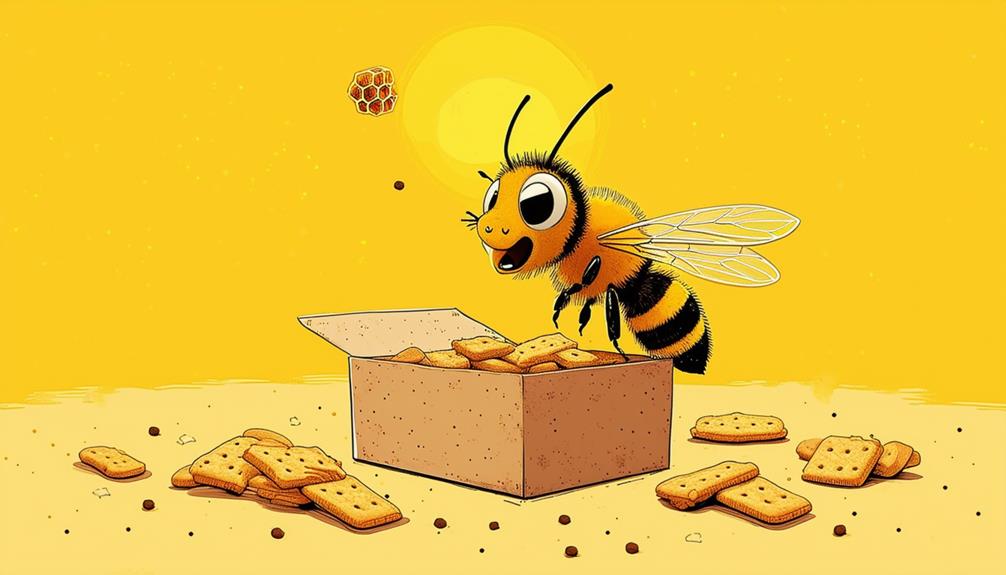You're wondering if animal crackers are vegan, but the answer isn't straightforward. Some brands, like Barnum's or Austin Zoo, are generally considered vegan-friendly. However, many animal crackers contain non-vegan ingredients like honey, gelatin, or L-cysteine, derived from animal sources. Even seemingly innocuous ingredients like 'natural flavors' or 'artificial colors' might not be vegan-friendly. If you're serious about following a vegan diet, it's crucial to scrutinize the ingredients list. There's more to uncover about animal crackers – from their ingredients to their impact on wildlife – and you're just getting started.
Cracking the Vegan Code
As you investigate the world of animal crackers, you'll quickly realize that cracking the vegan code demands more than just a casual glance at the ingredient list. You need to delve deeper to make sure that the brand you choose aligns with your vegan values.
One important aspect to examine is the presence of natural flavors. While the term 'natural' might seem harmless, it can be a red flag for vegans. Natural flavors can be derived from animal sources, making them non-vegan. Brands like Glutino Animal Crackers, for instance, contain natural flavors, which could be a concern for strict vegans.
When scrutinizing the ingredient list, look out for vague terms like 'natural flavors' or 'artificial colors' that mightn't be vegan-friendly. Instead, opt for brands like Barnum's Animal Crackers or Austin Zoo Animal Crackers, which are generally accepted as vegan-friendly options.
Sugar Coating the Truth
As you delve into the world of animal crackers, you're likely wondering what makes them tick – or rather, what makes them tasty.
Let's take a closer look at the flavor profiles and main ingredients inside these crackers, which can greatly impact their vegan status.
Animal Crackers Flavor Profiles
As you investigate the world of animal crackers, you'll notice that they come in a variety of flavors, from sweet treats like Cinnamon Sugar Animal Crackers to fruity options like Strawberry Fruit Flavor.
But have you ever stopped to think about what makes these flavors possible? Let's take a closer look at the ingredients behind these tasty treats.
Cinnamon Sugar Animal Crackers
You savor the sweet and spicy flavor of cinnamon sugar animal crackers, a popular variation of traditional animal crackers that adds a delightful twist to the classic snack.
The cinnamon sugar coating elevates the taste of the animal crackers, making them a nostalgic and tasty treat.
Some brands use artificial cinnamon flavoring, but the combination of cinnamon and sugar still delights your taste buds.
Chocolate Chip Animal Crackers
Chocolate chip animal crackers, a flavor profile that combines the sweetness of chocolate with the crunch of animal crackers, may not be as vegan-friendly as they seem. These treats may contain dairy or animal-derived ingredients, making them non-vegan.
Be sure to read the ingredient list, as some animal crackers contain unwanted additives.
Strawberry Fruit Flavor
Moving beyond the chocolatey world, strawberry fruit flavor is another popular profile in animal crackers. But its seemingly innocent sweetness hides potential pitfalls for vegans. You might assume it's just a fruity twist, but natural flavors are often used to achieve this taste. Their source is usually undisclosed, leaving you wondering if they're vegan-friendly.
Main Ingredients Inside
As you examine the ingredients list of animal crackers, you'll notice that the main components are Enriched Wheat Flour Blend, Vegetable Oil Blend, and High-Fructose Corn Syrup. These ingredients might seem harmless, but scrutinizing them further is crucial to determine their vegan status.
Let's break down each of these ingredients to uncover their origins and potential impact on your vegan lifestyle.
- Enriched Wheat Flour Blend
- Vegetable Oil Blend
- High-Fructose Corn Syrup
Enriched Wheat Flour Blend
When you bite into an animal cracker, you're primarily consuming a mixture of enriched wheat flour, which provides the necessary nutrients and texture that make this snack so appealing.
This vegan-friendly ingredient is a blend of iron, thiamine, riboflavin, and folic acid, forming the base of the dough and contributing to the cracker's texture and flavor.
Vegetable Oil Blend
What's hiding in your animal crackers' vegetable oil blend, and how does it impact their vegan status? The blend's composition varies by brand, but it can include palm oil, which raises environmental and ethical concerns. Check the ingredient list to determine the vegan-friendliness of your animal crackers.
| Vegetable Oil | Impact on Taste | Vegan Concerns |
|---|---|---|
| Canola oil | Neutral flavor | None |
| Soybean oil | Slightly nutty | None |
| Palm oil | Mild flavor | Environmental, ethical concerns |
High-Fructose Corn Syrup
You're likely consuming high-fructose corn syrup every time you munch on animal crackers, a common ingredient that's hiding in plain sight.
As a sweetener made from cornstarch, it's cheaper than sugar, but linked to health issues like obesity and heart disease.
Honey in Animal Crackers

Now that you've got a handle on sugar coatings, it's time to examine another common animal cracker ingredient: honey.
As you might know, honey is a sweetener derived from bees, which can be a problem for vegans who avoid animal by-products.
Let's take a closer look at how honey shows up in animal crackers and what it means for your vegan diet.
Gelatin in Animal Crackers
Now that we've established that gelatin is rarely used in animal crackers, you're probably wondering about other potential non-vegan ingredients.
Let's take a closer look at some other points to keep in mind when determining if animal crackers are truly vegan-friendly.
You'll want to check the ingredient list for these common non-vegan ingredients.
- Lactic Acid Derived
- Egg Whites in Crackers
- Confectioner's Glaze (Shellac Coating)
- Other animal-derived ingredients
Lactic Acid Derived
When scanning the ingredient list of your favorite animal crackers, be on the lookout for lactic acid, which can be derived from both plant and animal sources, making it a potential non-vegan culprit.
While lactic acid is typically vegan, some sources may be derived from animal products like lactose or whey, making it important to check the manufacturer's sources.
Egg Whites in Crackers
As you continue to scrutinize the ingredient list, you'll also want to watch out for egg whites, which can sneak into some animal crackers.
Glutino Animal Crackers, for instance, contain egg whites in both Original and Graham varieties.
Be sure to check the ingredient list carefully, as egg whites can render an otherwise vegan-friendly snack non-vegan.
Confectioner's Glaze (Shellac Coating)
You'll need to inspect the ingredient list for confectioner's glaze, a shiny coating derived from the lac insect's resinous excretions, which makes it an animal-derived ingredient that's off-limits for vegans.
This common coating is often used on candies and baked goods, including some animal crackers, so be sure to scan the label carefully to make sure it's vegan-friendly.
Carmine in Animal Crackers
When examining the ingredients of animal crackers, you'll want to explore other potential non-vegan ingredients beyond honey.
You might be surprised to find that some animal crackers contain other animal-derived ingredients or by-products.
Let's take a closer look at some of these ingredients.
- Beeswax Coating
- Natural Red 4 Lake
- Castoreum in Animal Crackers
- L-Cysteine in Animal Crackers
Beeswax Coating
When biting into a crunchy animal cracker, you might unwittingly be consuming beeswax, a non-vegan ingredient used as a coating in some recipes. Beeswax is an animal-derived ingredient, making it unsuitable for a vegan diet.
Since carefully reading labels or opting for vegan-friendly brands is crucial to avoid this hidden non-vegan ingredient.
Natural Red 4 Lake
Some animal crackers get their vibrant red color from Natural Red 4 Lake, a pigment derived from crushed cochineal insects, making them an unlikely culprit in the non-vegan category.
This pigment is also known as Carmine, a natural red color extracted from these insects.
If you're vegan, you'll want to steer clear of animal crackers containing Carmine, as it doesn't align with your ethical beliefs.
Castoreum in Animal Crackers
You might be surprised to learn that certain animal crackers contain castoreum, a unique flavoring derived from the castor sacs of beavers, which raises concerns for vegans and vegetarians alike.
As a natural flavoring, castoreum boosts vanilla, raspberry, and strawberry flavors, but its animal origin makes it non-vegan.
Always double-check the ingredient list to make sure your animal crackers are vegan-friendly.
L-Cysteine in Animal Crackers
L-Cysteine, a non-vegan amino acid derived from animal hair or feathers, is used as a dough conditioner in certain animal crackers, making them unsuitable for vegan diets.
As you scan the ingredient list, keep an eye out for L-Cysteine, which can be hidden in the fine print. Its presence means the crackers aren't vegan-friendly.
Crackers' Impact on Wildlife
How do animal crackers, with their cute animal shapes, actually affect the welfare of real animals in the wild? You might assume that, with their zoo animal crackers and jungle-themed packaging, animal crackers somehow contribute to animal exploitation. But, surprisingly, that's not the case.
The fact is, animal crackers don't directly impact wildlife or contribute to animal exploitation in any way. The symbolic representation of animals in crackers doesn't involve actual animal ingredients, so you can rest assured that consuming animal crackers doesn't harm or exploit real animals.
In reality, the debate around animal crackers relates more to symbolic representation and socialization than actual harm to wildlife. So, if you're concerned about animal welfare, you can opt for vegan animal crackers, which offer a cruelty-free alternative.
It's essential to separate the symbolic from the real and understand that animal crackers are simply a fun snack, not a threat to wildlife. By doing so, you can enjoy your favorite snack guilt-free, knowing that you're not contributing to any harm to real animals.
Frequently Asked Questions
Are Circus Animal Cookies Vegan?
You're wondering if Circus Animal Cookies are vegan, but unfortunately, they typically contain non-vegan ingredients like milk, gelatin, and eggs, so it's unlikely they fit your plant-based diet, but you can always check the ingredients or opt for vegan alternatives.
Do Animal Crackers Have Meat in Them?
You're wondering if animal crackers contain meat, and the answer is no, they don't! Traditional recipes use plant-based ingredients like flour, sugar, and flavorings, making them a meat-free snack.
What Are Animal Crackers Made Of?
You're curious about what's in those tasty treats! Animal crackers are typically made of wheat flour, niacin, reduced iron, thiamine mononitrate, and riboflavin – a mix of wholesome ingredients that create their signature taste and texture.
Do Animal Crackers Contain Gelatin?
You're wondering if animal crackers contain gelatin – the answer is no, they typically don't! Gelatin is usually found in gummies and marshmallows, not in animal crackers, which are made with plant-based ingredients like flour and sugar.
Conclusion
So, are animal crackers vegan? Unfortunately, the answer is no. Many brands use honey, an animal byproduct, in their recipes.
Even if they don't, the crackers' production process often involves animal-derived products or byproducts.
While some vegan alternatives exist, it's crucial to carefully read labels and research brands to make sure they align with your dietary choices.
By making informed decisions, you can enjoy crackers that fit your lifestyle while promoting a more sustainable and compassionate food industry.
